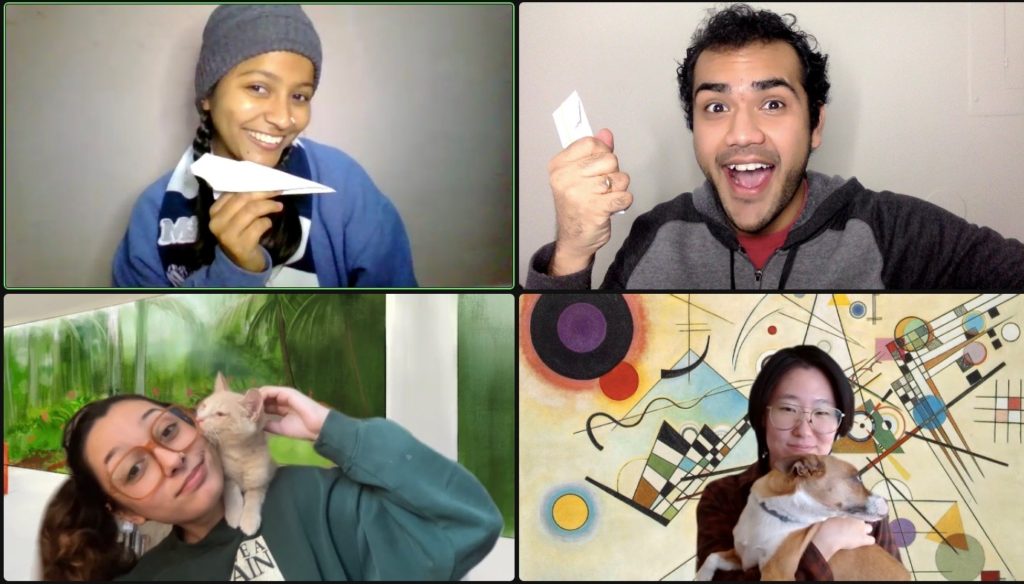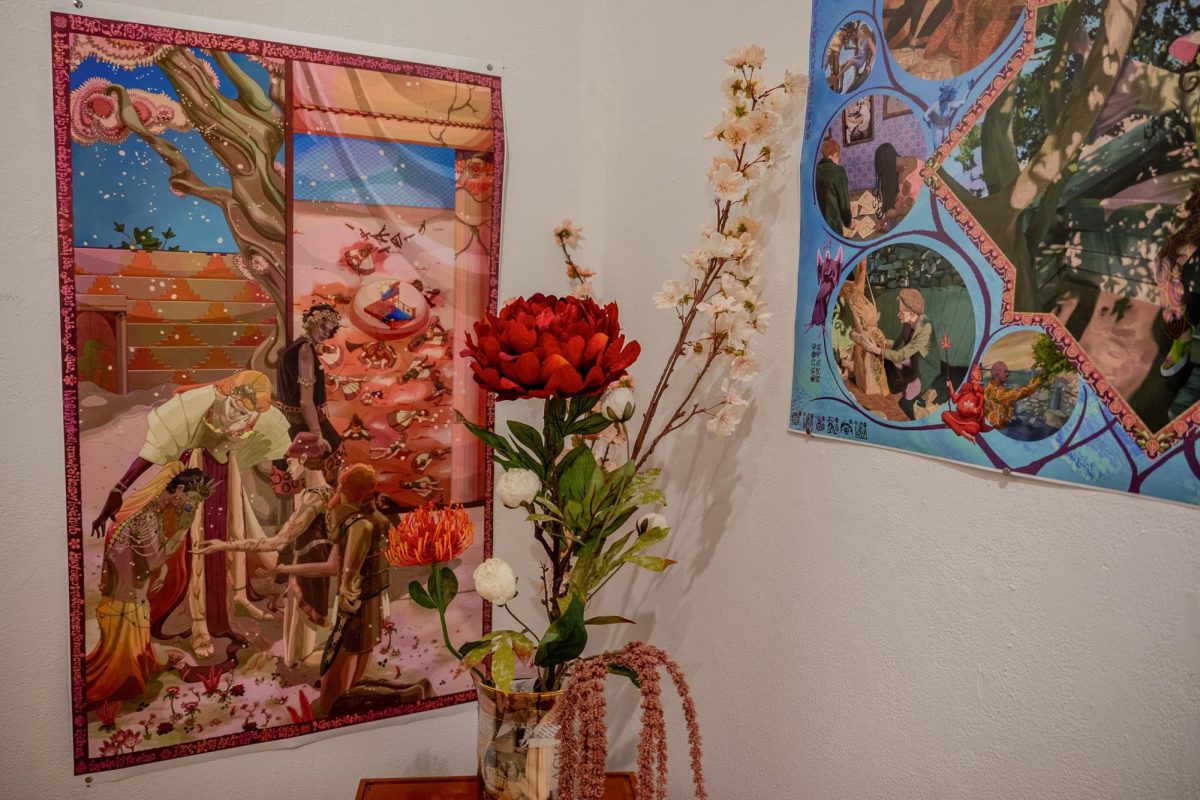What does it mean to pursue the impossible? What about the indulgent? What does it mean to be self-obsessed, devoted, imaginative, faithful and stupid enough to make art?
“Taramandal! Ek Naya Safar” by Ahon Gooptu `21, an adaptation of Neel Chaudhari’s play “Taramandal,” might be a meditation on what it means to be an artist. It might also be about relationships or loneliness or connection, or migration. Or maybe the play is about the human capacity, the beauty of everyday life and our search for purpose.
Mostly, it’s about trying to get somewhere –– and sometimes failing.
“Being here is the key to getting there,” says Anish’s grandmother in the sparse opening scene framed by a striking white background.
Anish, the protagonist played by Gooptu, who is tasked with traveling to space’s Chalawan System 46 light-years from Earth, is certainly trying to get “there.” The play’s title is Hindi for “Constellations! A New Journey.”
Tani, a young girl played by Priyanka Bhaskar Patil, is trying to get “there,” too. Her grandmother is in the stars. She’s left behind her hearing aids and Tani won’t be able to call her without them.
But both Anish and Tani fail to reach the stars, over and over again.
Gooptu directed, acted in, and devised the show with a grant awarded by Grinnell’s Alexander “Sandy” Moffett Fund for Practice in Theatre and Dance in its inaugural year. Gooptu is currently pursuing an M.A. in theatre and performance research at Florida State University, and more of his work can be found at www.ahongooptu.com.
Gooptu says that he first saw Neel Chaudhari’s “Taramandal” at home in Kolkata, India, where he fell in love with the show and decided that he wanted to devise an adaptation of the script.
“I thought the story by Neel Chaudhari was — even though it was specific to Indian characters, South Asian characters — the story about art making and dreaming for something bigger was a universal thing for artists,” Gooptu said.
Gooptu began to prepare to perform the show for his senior capstone project at Grinnell, but then the pandemic hit. Unprepared to tackle virtual theatre, Gooptu decided to apply for the Sandy Moffett Fund’s award, and regrouped in June 2020, when he co-facilitated the show’s devising process with Anjali Jain `21.
Devised theatre usually involves collaboration between a group of people and facilitators who create and workshop a script from scratch.
The first and only prompt for the ensemble devising Gooptu’s “Taramandal!” was to bring a song that each person associated with the word “stars.”
“Because I handpick these people,” Gooptu said. “I trust them. I know and I trust what’s working and what’s not working when they say what’s working, what’s not working.”
That trust, Gooptu said, was central to the play’s performance, too: the rehearsal process was two and a half weeks, and no two members of the ensemble ever performed in the same room, or even city, during that time.
Gooptu said that the ensemble’s shared experiences also contributed to a sense of understanding and trust, being entirely made up of Asian and South Asian people.
“When I wrote the proposal for the grant, I was interested in exploring specifically the importance and significance of artists who are migrants in this country. … Many of my favorite collaborators in college, most of whom I lived without throughout my senior year, I love them and I have collaborated with them — but there are just some things they don’t understand,” said Gooptu. “There are just some pressures that they don’t ever have to think about. And that’s a privilege, and that’s just something that, even though they empathize with me … they don’t have to think about,”
Sandy Moffett, professor emeritus at the College and the namesake of the Fund for Practice in Theatre and Dance, said that the award that funded Gooptu’s production was created by a group of his former students.
Moffett began teaching acting, directing, and American theatre in 1971, and in retirement has turned to novel writing and performance with local folk rock and country group Too Many Strings Band. He said he was “thrilled” to hear about the creation of the award.
“As a teacher, one of the most satisfying and exciting things to happen is when one or more of my students somehow lets me know they appreciate what I did as a teacher. So when this happened — as far as what happens in my teaching, it doesn’t get much better than that,” Moffett said.
Moffett said that he hoped the prize would create the opportunity for more multi-disciplinary work in theatre and dance in the future, adding that he especially enjoyed the acting in “Taramandal! Ek Naya Safar.”
The acting in “Taramandal! Ek Naya Safar” does stand out. Bhaskar Patil, in particular, acts beautifully as Tani; she treats childhood with respect and care. In one clever, fast-paced montage where she interacts directly with the camera as if the audience were another one of her childhood friends, Tani tries everything — from watering her plants every hour so that they will reach the sky, to tying fans to her arms and flapping as hard as she can to fly, bird-style, to using a huge magnet to pull stars to her — to see her grandmother again.
With Tani, dreams and magic are never the butt of the joke. Although the play sometimes fell prey to the technical difficulties that have become a mainstay of the Zoom era, the scenic design by Sooji Son `18 is striking, shifting between blank, minimalistic spaces and lush nature scenes. In sound design and editing, Son and Jain use the virtual medium to their advantage, alternating between static, radio feedback and music on live cue while Anish travels through space.
Gooptu turns in a captivating performance as Anish realizes that the distance to the Chalawan System is far longer than he expected and turns back to Earth. Confronted with terror at his loneliness, Anish cries in one of the most memorable scenes of the play: “I’m going forward into nothingness. How long can I stay, with nothingness, only me? Me, me, me, me, me?”
The scene takes on layered significance for those who have lived through the COVID-19 pandemic, migrants who feel alienated from themselves and the places they occupy, or anyone who has ever had to navigate the painful process of becoming comfortable with solitude.
But while Gooptu poses a lot of bleak questions in his rendition of “Taramandal!,” he also seems to offer a kernel of hope.
It is only when Tani and Anish meet at the end of the play that Anish is spurred to try to reach for the stars again.
Youth, dreams, faith, togetherness — “Here I go again!” Anish says.


























































